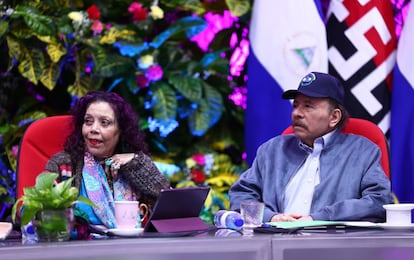Nicaragua’s Ortega and Murillo consolidate their power over the army and the police
The reform of the Military Code and the National Police Law subordinate the armed forces to the presidential couple’s wishes, just days after a constitutional change that protects their succession


Barely three days had elapsed since Daniel Ortega and Rosario Murillo ordered the approval of a complete reform of the Nicaraguan Constitution — with which they protected the family succession and buried what was left of the separation of powers — when the Sandinista parliament on Monday announced changes to the Military Code and the Law on the Organization of the National Police to extend the terms of the heads of the armed forces from five to six years.
In this way, the presidential couple continues to reform fundamental laws at a rapid pace in order, according to the opposition, to adapt its “totalitarian model” to a new legal framework “made to measure.” The reform to the legislation affecting the Police and the Army — the main repressive tools of Ortega and Murillo — grants the president full power over these armed institutions, to such an extent that he will not only be able to name the commander-in-chief of the Army and the director of the Police, but he will also be able to extend the position of the head of the police as many times as he wants, “according to the interests of the nation.”
The current police chief, whose term has been extended, is Commissioner General Francisco Díaz, whose daughter Blanca Díaz is married to Maurice Ortega-Murillo, one of the presidential couple’s sons. Díaz has been the police chief since August 2018, the year of the massive anti-government protests that police and paramilitaries repressed with such violence that a group of United Nations experts described it as “crimes against humanity.” Commissioner Diaz has been sanctioned by the United States for being the main operator of repression and human rights violations against Nicaraguans, specifically opponents of all kinds, members of the church, and journalists.
In the case of the reform to the Military Code, the Army remains, on paper, at arm’s length from the government, since the initiative establishes that “no relative of the President and Vice President of the Republic within the fourth degree of consanguinity and second degree of affinity may be appointed Commander-in-Chief of the Army.”
In practice, however, General Julio César Avilés has subjected the military to the Ortega-Murillo dictate. Not only has he boycotted the military succession after Ortega extended his term in office for 16 years, but in May 2020 the United States sanctioned him for “providing support to the police and paramilitary gangs that committed crimes against the Nicaraguan people.”
“Self-coup”
Nicaraguans had not yet fully assimilated and understood the profound change made to the Constitution when these new reforms were added on Monday, institutionalizing at the highest legal level what was already de facto: Ortega and Murillo’s control over the armed forces.
After beginning a “compaction of the State” and an unprecedented purge of public employees, three days ago the presidential couple ordered parliament to approve a tectonic constitutional reform: the new Magna Carta changes the meaning of the State of Nicaragua by naming it “revolutionary and socialist,” and creates a “co-presidency” shared between Ortega and Murillo, thus resolving the thorny issue of family succession. In other words, Nicaragua becomes the only country in the world known to have two presidents in office, according to complaints by opponents who prefer to remain anonymous for fear of reprisals against them and their families.
In addition, the reform allows the co-presidents to appoint vice-presidents as they consider necessary, without having to go through the popular vote. This provision has been interpreted by critics as an opening to appoint their own children, such as Laureano Ortega, whom his parents are promoting heavily in the new line of constitutional succession.
In addition to extending their presidential term from five to six years, the co-presidents will enjoy full powers over the Nicaraguan State. “The Presidency of the Republic directs the Government and, as head of State, coordinates the legislative, judicial, electoral, control and oversight, regional and municipal bodies, in compliance with the supreme interests of the Nicaraguan people and the provisions of this Constitution,” says the new constitutional article 132.
In addition, the co-presidents will be able to officially appoint and remove ministers, vice-ministers, attorneys, directors of autonomous and government agencies, heads of diplomatic missions and heads of special missions, as they had already been doing de facto with the state purge.
In total, this change to the Constitution affects a hundred articles, which legalize paramilitaries, empower the Nicaraguan Army to conduct repression for political reasons alongside the National Police, and justify the stripping of nationality from critics considered “traitors to the homeland.”
A group of opposition members in exile gave EL PAÍS a statement in which they describe what the presidential couple has done as a self-coup. “Under the guise of a partial reform to the Political Constitution, they are making a new one, which is the exclusive power of a National Constituent Assembly,” they claim. “A large number of rights and guarantees established in the dogmatic part of the Constitution are being regressively altered; the nature of a series of institutions is being modified, mainly the Army and the Police, and the door is being left open for the Executive, now called the Presidency, with its absolute power, to regulate and control, through secondary laws, the country’s economy.”
The exiled opponents insist that with these reforms, “Daniel Ortega and Rosario Murillo seek the consolidation of a hereditary family dictatorship, accumulating more power than they have, establishing at the constitutional level the dynastic family succession and the absolute power that they already exercise over Nicaragua. By establishing a co-presidency, which replaces the Executive Branch, they resolve their own differences, to satisfy Rosario Murillo’s personal aspirations.”
Another law to protect against international sanctions
In this rush of reforms and new “à la carte” laws, the presidential couple approved a new regulation on Monday: the “Law of Protection against Sanctions and External Aggressions,” which puts the national financial system at a crossroads with international banking, because it not only orders banks to not apply future sanctions, ranging from restrictions on financial operations to the closure of bank accounts, but also leaves without effect those sanctions already in place. In other words, it would force national banks to reopen the accounts of sanctioned officials.
In case of non-compliance with the law, the regulations impose fines on financial institutions that do not reverse the sanctions. They also threaten jail and accusations of “treason” against individuals from financial institutions that decide to comply with international guidelines.
The approval of this law marks Nicaragua as a place of “high financial risk” and turns it into an “outlaw state,” explains the researcher Manuel Orozco, since it makes the country a safe place for sanctioned persons and entities. The reaction of the international financial system and its response to this measure remains to be seen. However, the goal of this law is to force domestic banks to look for financial markets other than the United States, which is, for now, Nicaragua’s largest trading partner. And the regime is looking, in light of its new international relations, at China, Russia, and Iran.
Sign up for our weekly newsletter to get more English-language news coverage from EL PAÍS USA Edition
Tu suscripción se está usando en otro dispositivo
¿Quieres añadir otro usuario a tu suscripción?
Si continúas leyendo en este dispositivo, no se podrá leer en el otro.
FlechaTu suscripción se está usando en otro dispositivo y solo puedes acceder a EL PAÍS desde un dispositivo a la vez.
Si quieres compartir tu cuenta, cambia tu suscripción a la modalidad Premium, así podrás añadir otro usuario. Cada uno accederá con su propia cuenta de email, lo que os permitirá personalizar vuestra experiencia en EL PAÍS.
¿Tienes una suscripción de empresa? Accede aquí para contratar más cuentas.
En el caso de no saber quién está usando tu cuenta, te recomendamos cambiar tu contraseña aquí.
Si decides continuar compartiendo tu cuenta, este mensaje se mostrará en tu dispositivo y en el de la otra persona que está usando tu cuenta de forma indefinida, afectando a tu experiencia de lectura. Puedes consultar aquí los términos y condiciones de la suscripción digital.








































